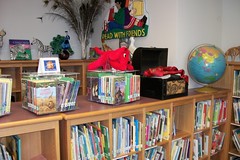Sunday, June 20, 2010
Friday, April 9, 2010
Top 100 Picture Books Poll Results (#1-101)
And now, in order and with linkety goodness intact, I bring to you the results of the Top 100 Picture Book Poll of 2009. Please note two chan..."
Saturday, April 3, 2010
On Sara Scribner "Saving the Google Students"
The following is from the LA Times, March 21 by Sara Scribner
Opinion
The current generation of kindergartners to 12th graders -- those born between 1991 and 2004 -- has no memory of a time before Google. But although these students are far more tech savvy than their parents and are perpetually connected to the Internet, they know a lot less than they think. And worse, they don't know what they don't know.
As a librarian in the Pasadena Unified School District, I teach students research skills. But I've just been pink-slipped, along with five other middle school and high school librarians, and only a parcel tax on the city's May ballot can save the district's libraries. Closing libraries is always a bad idea, but for the Google generation, it could be disastrous. In a time when information literacy is increasingly crucial to life and work, not teaching kids how to search for information is like sending them out into the world without knowing how to read. Instead of simply navigating books and the Readers' Guide to Periodical Literature -- an annual index of magazine and newspaper articles used in the olden days -- today's students sift through an infinite number of options: books, Internet sources, academic databases. Much of the time they opt for Google, which is like beingtossed into the ocean without a paddle.
An info-literate student can find the right bit of information amid the sea of irrelevance and misinformation. But any college librarian will tell you that freshman research skills are absolutely abysmal. Before they graduate from high school, students need to be able to understand the phenomenal number of information options at their fingertips, learn how to work with non-Google-style search queries, avoid plagiarism and judge whether the facts before them were culled by an expert in the field or tossed off by a crackpot in the basement.
As even struggling school districts manage to place computers in classrooms, it's difficult to find a child without Internet access. But look closer at what happens when students undertake an academic task as simple as researching global warming -- tens of millions of hits on Google -- and it becomes clear that the so-called divide is not digital but informational. It's not about access; it's about agility.
Most children consider a computer search second nature, so trying to give them instruction or advice can be difficult. Recently, noticing that a sixth-grader didn't know how to search the school library catalog, I tried to show him the steps. "You don't need to tell me," he said, clearly insulted. "I know how to use a computer!"
The issues Ms. Scribner writes about are not rare. I have seen all of these information missteps happen and for children to be able to navigate through all of the good and bad, useful and non-useful, applicable and non-applicable sites, they need to learn some information navigating and evaluating tactics. It is worrisome that many young internet -users think they already are correctly and completely accessing answers to their queries and that the librarians who can teach them these steps are losing their jobs.Sunday, February 7, 2010
Thursday, December 24, 2009
Method 12: Reflection and Evaluation
Wednesday, December 23, 2009
#11-The Wide World of Podcasting
Podcasting will be possible with my students and I already have all the equipment I need to create them. I think, though, for podcasts to be enjoyed by my students, they would have to be vidcasts because many of the children are second-language learners and need the pictures for comprehension.
